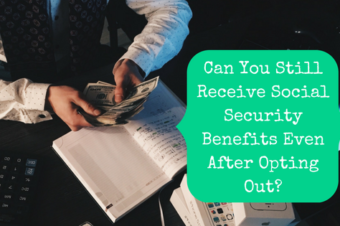
With businesses shutting down and church services closed, you may find yourself reassessing your financial situation. Which expenses are mandatory and which can you do without? What resources do you have available to you that you don’t usually access? As you’re taking stock of your situation, I’d like to let you know about a few changes that the CARES Act stimulus bill makes to the rules about your retirement savings.
2020 Required Minimum Distributions Waived
This is one that really only helps those who already have more than enough to live on. Required minimum distributions (RMDs) from traditional IRAs, SEP IRAs, SIMPLE IRAs, and 401(k), 403(b), and governmental 457(b) plans are waived for the year 2020. The waiver applies to beneficiary account owners in addition to original account owners. Basically, no one has to take RMDs for 2020.
If you’ve already taken an RMD that you really don’t need, the law allows you to put it back. (This option is only available to original account owners, not beneficiaries of inherited accounts.) Unfortunately, putting it back isn’t quite as simple as it sounds. If your RMD was taken within 60 days, then you can roll it into another account or back into the same one. If your RMD was taken more than 60 days ago, then a more complicated strategy will have to be used. You will want to consult with a financial advisor if you have already taken an RMD for 2020 and want to put the money back into a retirement account.
Penalty-Free Withdrawals Allowed
For most of you, the above doesn’t apply. Instead of having extra money lying around, you’re looking for extra money to meet your expenses. The CARES Act makes it easier to tap into your retirement accounts. Usually, if you withdraw money from an IRA or employer-sponsored retirement account before you reach age 59 ½, you are charged a 10% penalty on the money. The government provides tax-advantaged accounts for you to save for retirement and they don’t like it if you take the money out before retirement.
The CARES Act allows you to withdraw up to $100,000 from your retirement accounts penalty-free if it is a coronavirus-related distribution. What’s a coronavirus-related distribution? It is a distribution made in the year 2020 by people who meet one of the following criteria:
- Have been diagnosed with COVID-19
- Have a spouse or dependent who has been diagnosed with COVID-19
- Experience adverse financial consequences as a result of being quarantined, furloughed, being laid off, or having work hours reduced because of the disease
- Are unable to work because they lack childcare as a result of the disease
- Own a business that has closed or been forced to operate under reduced hours because of the disease
- Meet other IRS-approved criteria
In addition to waiving the 10% penalty, these coronavirus-related distributions are not subject to mandatory tax withholding. Under normal circumstances, 20% of your withdrawals are withheld to pay taxes. So, if you withdraw $1,000 from your retirement account, you only get $800 because the other $200 is set aside for taxes. That isn’t happening right now; you get everything that you take out. Also, you can choose to pay any related income taxes over the next three years instead of all at once.
Should You Access Your Retirement Savings?
The CARES Act makes it a lot easier to tap into your retirement savings. But should you? That’s really up for you to figure out; my job is only to make you aware of the consequences.
The obvious consequence is that if you take the money out now, you won’t have it for retirement. However, using $2,000 today isn’t the same as having $2,000 in retirement. Let’s say you plan to retire in 30 years and you’ve got your savings invested in the stock market (which, by the way, had their best week last week since 1974) earning 8%. What is worth $2,000 to you today will be worth about $21,800 at retirement if left invested.
Another downside to tapping into your investments is that now is not a good time to sell. When it comes to investing, the way to make money is to sell when prices are high and buy when prices are low. The most popular way to lose money investing is to buy when prices are high and sell when they are low. Stock prices are pretty low right now, so depending on when you bought, you could be selling at a loss.
What Are Some Other Options?
If I’ve ruined the appeal of tapping into your 403(b), what are your other options? If your plan allows it (not all retirement plans do), then you may be able to take a loan from your current employer’s plan. The CARES Act increased the amounts that people are allowed to borrow from their retirement plans. However, that isn’t without risk. First of all, if you take the money out, then you miss out on any growth in the stock market until it is put back in (selling low again). Second, if you don’t pay the loan back (usually you have 5 years), it will count as an early withdrawal (as discussed above) and may be subject to the 10% penalty (depending on if it qualifies as a coronavirus-related distribution). Finally, if you lose your job, the loan will be due immediately, so you won’t have 5 years to pay it back and you’ll suffer the same consequences mentioned in the last sentence.
Are there any other options? Yes! If you’ve lost your job or even just part of your wages, you can apply for unemployment. The CARES Act made unemployment benefits much more broadly available than usual, so now independent contractors, part-time workers, and those experiencing a pay cut can be eligible. And the Act also increased benefits by $600/week and extended the length of time they are paid.
I know, you’re waiting for me to rain on the parade and start listing the negative consequences, as I’ve done in every other section of this article. There aren’t really negative consequences, but there is a downside. The downside is that unemployment has skyrocketed and most state unemployment agencies are not prepared to handle the applications coming in. So, it could take a while. I have friends who have been waiting for 3 weeks and have yet to see any benefits. But it doesn’t hurt to try, maybe your state is faster!
Finally, if you can’t make ends meet, see what hardship assistance is available to you. The CARES Act suspended payments on student loans through September and a lot of other companies are offering assistance. Talk to your landlord. Call your credit card companies. Call your auto or mortgage lender. Don’t be shy; ask for what you need. And don’t forget to pray before dialing the number! I have a feeling that during this season God is going to provide in some very creative ways.



